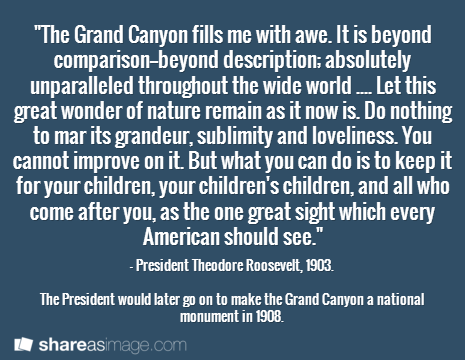In 1906, a Republican Congress passed the Antiquities Act. A Republican president, Teddy Roosevelt, signed it. Now some Republicans in Congress, such as Rep. Rob Bishop of Utah, want to gut it, and a vote may be come as early as this week.
The Antiquities Act was written to give a president the authority to quickly set aside important pieces of land that needed protection, such as the fragile and vulnerable ancient ruins of Mesa Verde at-risk to looting. Over the years, this Act has been used by presidents from both parties to protect culturally and environmentally important landscapes before these landscapes suffered irreparable harm from development, exploitation or vandalism. Many of America's finest landscapes started out as national monuments, including the Grand Canyon, Death Valley, Bryce and Zion. It's hard to imagine anyone today arguing that preserving those landscapes was a mistake and an injustice to private enterprise, the spirit of capitalism, or a trampling of states' rights. But it appears there are some in Congress who do think it tramples on some divine right of developers to reap profits from a landscape that helped forge the American experience.
Rep. Bishop recently introduced H.R. 1459. This bill, if passed and signed into law, would limit the number of times a president could use the Antiquities Act during a term. It would also require Congress to review new national monuments, and local communities to weigh in on the environmental impacts of new monuments in their region. Since 2009, Congress has failed to set aside any new lands for federal protection, with the exception of a new wilderness designation in Sleeping Bear Dunes. While that designation was important, it was already protected as a national park.
We all know how dysfunctional the U.S. House of Representatives has become. In times like these, the Antiquities Act is often our last hope for conserving our treasured landscapes. This bill would allow Congress to veto and prevent the protection of any new lands in the United States for future generations. It's an ironic position since conservative politicians have made much ado about the federal deficit that robs our grandchildren of their future fiscal health, but have been unwilling to fix similar problems even when it puts our national parks in peril. Overall, H.R. 1459 would end a long tradition of extending protection to iconic landscapes and features, and it would essentially end any significant additions to our system of national monuments, most of them currently managed by the National Park Service.
This effort to gut the Antiquities Act is depressing for a number of reasons. First, I understand that past presidents have designated national monuments that were unpopular with states and local communities. In the long run, however, those designations pay economic and spiritual dividends in places such as Grand Staircase Escalante National Monument. National monuments attract tourism and recreational dollars while preserving landscapes that have been an integral part of the American experience ever since our ancestors crossed over to the new world over 10,000 years ago. (And I mean all of our ancestors.) The landscapes preserved as national monuments and national parks preserve remnants of the lands that helped to forge our identity. Adding national monuments also continues a positive legacy of including all of the stories that have gone into the fabric of our history.
I guess those in Congress in favor of gutting the Antiquities Act think we have all the monuments and landscapes we need. There are no more coastlines that need protection. No new Americans who need veneration. No new battles that need commemoration. It's open season for developers, business, oil and gas on the rest of America. I've argued a number of times now, in blogs, and in media interviews, that we can have a balanced and thoughtful approach to development on public lands without sacrificing our national values contained and defined within the public lands we've chosen as our national parks and monuments. There are still areas that need protection, and that can be protected for future generations without impacting our ability to develop our nation's resources. But that takes thoughtful planning and a willingness to meet on open ground in the spirit of doing what's right for the country in the long haul and for those future generations. It means developing our energy reserves without destroying the fabric of our traditions and our legacy as a people.
In our interest to develop and extract the remaining natural resources our country was blessed with we might keep in mind that all those resources are finite. They will run out. We should be looking at this era of a second energy boom, thanks to fracking in places such as North Dakota, as a grace period to prepare for a time when the world won't be running on fossil fuels or tropical hardwoods. It would be a good thing if we got to that new horizon with our national monuments intact and still growing. They, along with national parks and our other federal lands preserved for future generations, truly are the gifts of a people that keep on gifting.
